Watch the video to see how CGP can help your doctor create a treatment plan that’s personalized to you.

Cancer is personal—your treatment plan should be, too
If figuring out your advanced cancer treatment options seems difficult or intimidating, the FoundationOne®CDx test can help you take your next step with confidence.
What is the test?
For people with all types of advanced solid cancer, the FoundationOne CDx test uses comprehensive genomic profiling (CGP) to read your cancer’s DNA. CGP, a type of biomarker testing, can help identify what is causing cancer to grow or spread. This information from this testing can be used to help identify how your tumor may respond to treatment.
Foundation Medicine offers different testing options for all cancer types based on your sample type. Your doctor will determine which test is right for you.

The FoundationOne®CDx test is a tissue-based genomic test for solid tumors like lung cancer, colorectal cancer, breast cancer, and prostate cancer.
Covered by Medicare
FDA Approved

The FoundationOne®Liquid CDx test is a blood-based genomic test, also called a liquid biopsy, for solid tumors like lung cancer, colorectal cancer, breast cancer, and prostate cancer.
Covered by Medicare
FDA Approved
Ask your doctor if this testing is right for you. Your doctor will order the test that is appropriate for you.
We also offer a laboratory-developed test for blood cancers, like leukemia and lymphoma, and for sarcomas:
How does the test work?
Understanding how the FoundationOne CDx test works starts with understanding the importance of mutations and biomarkers.
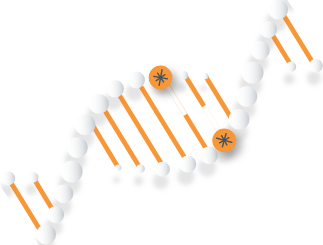
Mutations are changes in DNA that can influence cancer growth (also called “alterations”). For example, mutations in BRAF, ALK, EGFR, HER2, and KRAS genes are associated with advanced solid cancers.

Biomarkers are measurable characteristics within a cancer cell. The status of certain biomarkers may predict response to immunotherapy treatments.
Analyzing both mutations and biomarkers can provide critical information about how your cancer may respond to treatment.
This is where the FoundationOne CDx test plays a key role.
By reading your tumor’s DNA, searching for mutations in over 300 genes, and analyzing tumor biomarkers, the FoundationOne CDx test provides the genomic information that can help create your personalized cancer treatment plan.
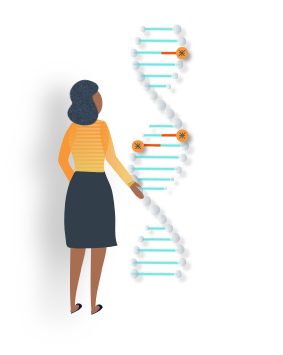
Mutations and biomarkers
can tell us how a tumor may
respond to treatment.
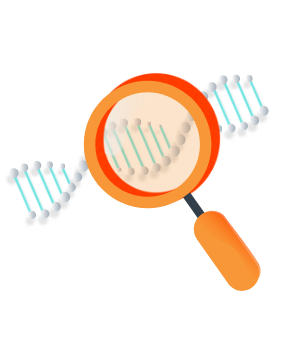
The FoundationOne CDx test searches over 300 genes for mutations and biomarkers.

This information may help you and your doctor create a treatment plan that’s as personalized as possible.
The FoundationOne CDx test is a genomic test that provides you with information about your tumor’s DNA. The FoundationOne CDx test does not provide information about genetic or inherited risks for developing cancer.
What kind of information can the test provide?
When making treatment decisions, the FoundationOne CDx test provides important information that may help you and your doctor create a treatment plan beyond traditional options:

Targeted therapy may stop the growth of cancer cells by targeting certain mutations.
Immunotherapy helps your body’s own natural immune system attack cancer cells.

Clinical trials allow eligible patients to access new potential treatments that are in development.
You may also be able to rule therapies out. Your test results can help you and your doctor know which treatments may not work for you—allowing you to focus only on options that may make a difference and avoid unnecessary treatment.
The presence of a mutation does not guarantee that you will be matched with a therapy.
Please view our FAQ or read our Notice of Privacy Practices for more information on how Foundation Medicine uses your health information.
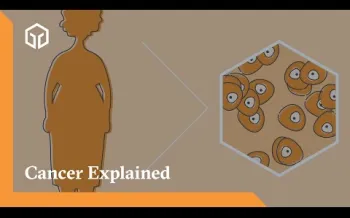
How is the FoundationOne CDx test different from other types of cancer testing?
When doctors need to gain a more comprehensive understanding of your cancer, they may order a genomic test. But not all genomic tests are created equal. Some genomic tests only look for one mutation or biomarker. Others look for mutations in a larger number, or panel, of genes.
The FoundationOne CDx test looks at hundreds of mutations and biomarkers at once—while using just one tissue sample.
With this broader analysis, you and your doctor can make more informed decisions about treatment options that are personalized to your cancer.
Find out more about the testing process
Stay connected. Stay informed.
Advanced cancer can come with many unknowns. Foundation Medicine is committed to keeping you and your loved ones informed, educated, and empowered. Sign up to receive email updates from us.
Other important information about FoundationOne CDx
Intended Use Statement
FoundationOne®CDx is a qualitative next-generation sequencing based in vitro diagnostic test for advanced cancer patients with solid tumors and is for prescription use only. The test analyzes 324 genes as well as genomic signatures including microsatellite instability (MSI) and tumor mutational burden (TMB) and is a companion diagnostic to identify patients who may benefit from treatment with specific therapies in accordance with the approved therapeutic product labeling. Additional genomic findings may be reported and are not prescriptive or conclusive for labeled use of any specific therapeutic product. Use of the test does not guarantee a patient will be matched to a treatment. A negative result does not rule out the presence of an alteration. Some patients may require a biopsy. For the complete label, including companion diagnostic indications and important risk information, please visit www.F1CDxLabel.com.
Other important information about FoundationOne®Liquid CDx
FoundationOne®Liquid CDx is for prescription use only and is a qualitative next-generation sequencing based in vitro diagnostic test for advanced cancer patients with solid tumors. The test analyzes 324 genes utilizing circulating cell-free DNA and is FDA-approved to report short variants in 311 genes and as a companion diagnostic to identify patients who may benefit from treatment with specific therapies (listed in Table 1 of the Intended Use) in accordance with the approved therapeutic product labeling. Additional genomic findings may be reported and are not prescriptive or conclusive for labeled use of any specific therapeutic product. Use of the test does not guarantee a patient will be matched to a treatment. A negative result does not rule out the presence of an alteration. Patients being considered for eligibility for therapy based on detection of NTRK1/2/3 and ROS1 fusions should only be tested if tissue is unavailable. Patients who are negative for companion diagnostic mutations should be reflexed to tumor tissue testing and mutation status confirmed using an FDA-approved tumor tissue test, if feasible. For the complete label, including companion diagnostic indications and complete risk information, please visit www.F1LCDxLabel.com.
